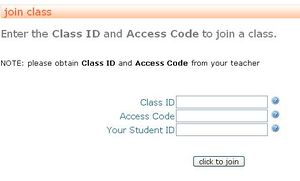Difference between revisions of "Self registration"
From RCampus Wiki
| Line 9: | Line 9: | ||
# Students follow the instructions to join the class. | # Students follow the instructions to join the class. | ||
# As students join the class, the [[roster]] is built. | # As students join the class, the [[roster]] is built. | ||
| + | |||
==Inviting students== | ==Inviting students== | ||
| Line 18: | Line 19: | ||
Note 2: Teachers can set the deadline for students to join the class. | Note 2: Teachers can set the deadline for students to join the class. | ||
| + | |||
==Steps for students== | ==Steps for students== | ||
Revision as of 21:25, 19 December 2011
Self-registration is when students join a class on their own. This is the preferred method of building a class roster.
See manual registration for a less-efficient method of building a roster.
Contents
How it works
- Invites students (see below).
- Students follow the instructions to join the class.
- As students join the class, the roster is built.
Inviting students
- Create a class or go to an existing class.
- From the side menu of class website, select Invite Students.
- Give the instructions to students.
Note 1: Students who joined the class late will have access to class materials and communications from day one.
Note 2: Teachers can set the deadline for students to join the class.
Steps for students
Please see joining a class for students to join a class.
Benefits of self-registration
- Roster is built automatically (no manual entry is required by teachers).
- Student profiles are created and maintained by students and not by faculty members. This allows students to control their email address and email notification settings.
- Students can access coursework materials, grades, message board, etc.
